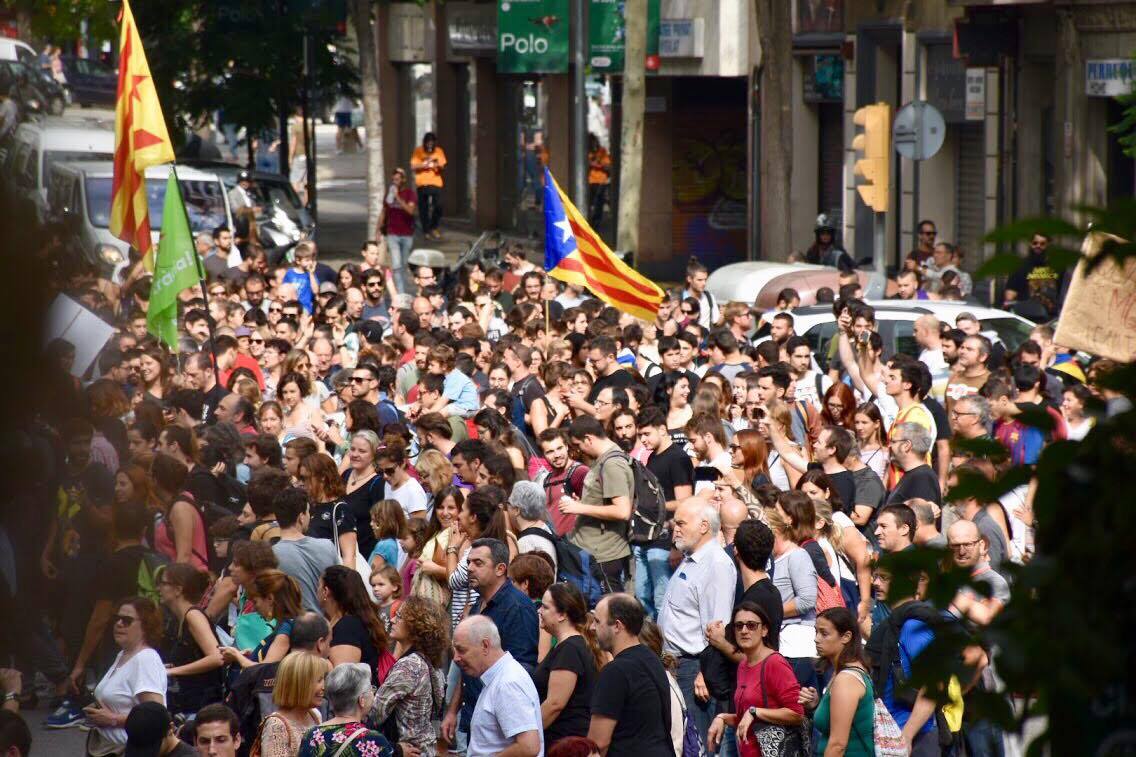Student in Barcelona witnesses struggles for Catalan independence
Senior Elana Rivkin got more than she bargained for when she decided to study abroad this semester in Barcelona. Between her classes, Rivkin is getting an up-close and personal experience with the controversial independence referendum that is inciting protests and violence across Catalonia.
Carles Puigdemon, the Catalan president, promised that he was going to make Catalonia its own independent country. Since being elected, Puigdemon is doing everything he can to follow through with his promise. However, seceding from Spain is considered illegal.
On Oct. 1, Catalonia held an illegal referendum, or vote, to see whether or not the majority of Catalonia wanted to secede. According to Rivkin, the results were very skewed. Only about 40 percent of Catalonia voted, with 90 percent of that favoring secession.
The Spanish government is aware of everything that is going on are have been trying to put a stop to the referendum and any plans to becoming independent.
“The thing that’s interesting is that the Cataluñas are peacefully protesting while the Spaniards are more violent,” Rivkin said. During the referendum, police were shooting rubber bullets at voters and beat people with batons, trying to dissuade people from coming to the illegal polls. According to the mayor of Barcelona, more than 460 people were injured in disturbances across Catalonia due to the referendum.
A large concern with this independence referendum is what it means for FC Barcelona, the Catalan regional team in La Liga, the premier Spanish soccer league. If Barcelona is not part of Spain, then the team would not be able to play in the league. In Spain, sports are extremely important to the culture and politics of the region.
“I don’t think there’s any way in hell they’ll stop FC Barcelona,” she said. She believes that if the independence does happen, they will be able to find a way to continue to keep FC Barcelona in the league.
Since being in Barcelona, Rivkin has had her classes cancelled three times due to the protests. “People are running around with Cataluña flags, there are counter protests… it’s getting crazier and crazier by the day,” she said. “It’s very interesting to go outside and witness it and then go back to your day.”
Last weekend there was a protest right outside Rivkin’s apartment window of almost 1 million people.
“It was kind of surreal to look out my window and see a crazy powerful group of people,” said Rivkin.
On Tuesday night, Puigdemon addressed Catalonia about the results from the referendum. Rivkin says that it is unclear what the final decision is. Translated by the BBC interpreter, Puigdemon states in his speech, “I am not planning any threat… We’re not criminals… We’re not rebels. We are normal people and we just want to vote… We need to go forward together, whatever happens… The only way to move forward is democracy and peace.”
As of right now, tensions are still high between Catalonia and the rest of Spain. The European Union has made it clear that a declaration of independence from Catalonia would not be recognized. They believe that if Catalonia secedes, then other autonomous regions such as the Basques of Spain, the Corsicans in France or the Flemish in Belgium may also attempt to secede from their governments, respectively.
Large companies in Barcelona and other parts of Catalonia have begun to close their doors and leave the region. Banco Sabadell, one of the region’s largest banks, is moving its headquarters to Alicante, a southern Mediterranean port city. CaixaBank, Catalonia’s largest bank, is also discussing moving its headquarters. Oryzon Genomics, a biotech company that works on cancer-fighting drugs, is relocating from Barcelona to Madrid.
“I’ve been trying to formulate an opinion [on Catalonia’s independence],” said Rivkin. “I think I’m leaning towards it because I understand their reasoning… they really want their own way of doing things… I respect the protests and I respect what they’re doing. The fact that they’re doing it peacefully is really admirable.”
As a film major, Rivkin is hoping to create a documentary from her time in Barcelona during this heavily political and historical movement. “What better time to do something like this when I’m actually in a moment in history?” she said.
Rivkin is still deciding on the direction her documentary is going to go. “My documentary will feature a juxtaposition of Europeans’ perspectives on American culture and politics, with particular focus on the Catalonian fight for independence centralized here in Barcelona,” she said.
After being in Barcelona for a month, Rivkin has already learned so much about the similarities and differences between Europeans and Americans.
“I hope to shed light on some of these perspectives in a compelling manner, and also include some scenic footage of this incredibly beautiful country,” she said.

